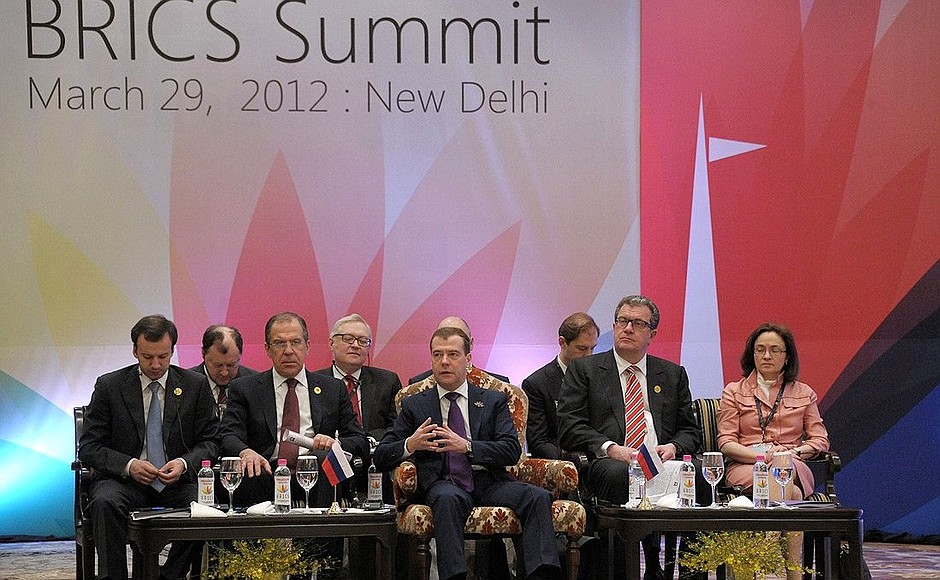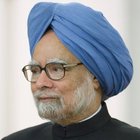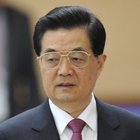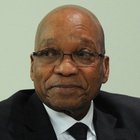
President of Russia Dmitry Medvedev: Colleagues,
Your Excellency Prime Minister Manmohan Singh,
Your Excellency President Dilma Rousseff,
Your Excellency President Hu Jintao,
Your Excellency President Jacob Zuma,
Ladies and gentlemen,
First of all, I would like to express my gratitude to Prime Minister Manmohan Singh for the warm welcome and excellent organisation of the summit.
Based on my three years of experience participating in the establishment and development of our association, I would like to take this opportunity to share the vision of its long-term prospects at this expanded meeting, because the specific issues of global economic policy, the international financial situation, the Millennium Development Goals and a number of political matters were discussed at the restricted meeting.
I am sure you will agree with me that the progress made by our forum in such a short time is both indicative and deserves respect. Not only did we succeed in establishing this association but it has become a global-scale forum. A dozen formats for intergovernmental cooperation are already working productively, and today we have set the stage for the development of new formats.
The business community is increasingly becoming involved in BRICS activities, as well as the academia, the regions that make up our countries, and nongovernmental organisations. All this makes up the practical aspect of our association.
I believe that the similarity of our vital interests is the reason for the success of the BRICS project. We are all interested in reforming the outdated global economic and financial system. This reform has been in progress for some time but today we have expressed our dissatisfaction with the pace at which it is proceeding, and this is reflected in the draft of our declaration.
”A gradual transformation of BRICS into a fully-developed mechanism of interaction on major issues in global economy and politics could become our strategic goal.“
This system still disregards the global economic role played by the BRICS nations, as well as other countries with emerging markets. At the same time our economies are mutually complementary, while our social systems, our civil societies face similar challenges related to the modernisation of many spheres of public life.
It is also essential that the members of this “group of five” are committed to the principles of international law in the classic sense of the word. We cannot accept the policy of military pressure and infringement on the sovereignty of other countries.
All of this allows us to predict the successful development of BRICS. In the future, our organisation can become one of the key elements in the global governance system. Russia believes that BRICS must be positioned as a new model of relations, which is not based on stereotypes or structures such as bridges or mediators. This approach to the alliance of countries with a total population of nearly 3 billion people deliberately restricts their independence in implementing coordinated policies on the international arena. And now, in addition to economic issues, we are discussing international politics and the challenges facing humanity today.
A gradual transformation of BRICS into a fully-developed mechanism of interaction on major issues in global economy and politics could become our strategic goal. Such a step forward is only possible through joint efforts on the concept. I would like to suggest that our Foreign Ministers begin this work.
The adoption of the forum’s foreign relations strategy is also long overdue as it will help anchor the BRICS in the international relations system, to expand and strengthen the gravitational field which is already being formed around our five countries.
There is a need for an ongoing dialogue with major developing countries and emerging regional organisations. We must also work more closely with the United Nations. This is due to what I said earlier: we are committed to the classical interpretation of international law principles.
I believe one of the BRICS priorities for the coming years is preserving and strengthening the central role of the UN Security Council in maintaining peace and security in the world, as well as preventing the manipulation of the UN to cover up the policy of toppling unwanted governments and imposing unilateral solutions to conflict situations. Russia supports India, Brazil and South Africa as strong candidates for membership in the UN Security Council.
”The forum’s foreign relations strategy will help anchor the BRICS in the international relations system. There is a need for an ongoing dialogue with major developing countries and emerging regional organisations. We must also work more closely with the United Nations.“
We favour the mechanism of dialogue, and in the future the coordination of practical efforts in the field of international security. Such a mechanism could include regular meetings of senior representatives in charge of national security issues, as well as expert consultations.
Today as I said we discussed the global financial situation, but the reform of the international monetary and financial system remains an important area of BRICS states’ cooperation.
We will continue to promote the strong, sustainable and balanced growth of the world economy, contribute to the completion of the current stage of the International Monetary Fund reform and the creation of a more representative, stable and predictable system of international reserve currencies.
These challenges are currently being tackled mainly through the efforts of the G20. Therefore we must take advantage of our association to strengthen the position of the G20 and to promote coordinated approaches.
We consider it essential to strengthen the role of national currencies in mutual settlements between the BRICS countries. This is the aim pursued by the General Agreement on Granting Loans in National Currencies as Part of the Mechanism of the BRICS States' Inter-bank Cooperation and the Multilateral Letter of Credit Agreement, which will be signed at the end of our meeting.
The mineral resources of our countries are a huge potential for growth for the global economy as well as for our national economies. However, this area does not only present growth opportunities but also problems for our development, as we noted today. Therefore, time has come to launch dialogue on the balanced development of these sectors, not only in a bilateral format but also in the BRICS format.
We must communicate more directly too in the field of emergency humanitarian response. We advocate the creation of an appropriate BRICS mechanism for exchanging experiences, joint exercises and coordination in emergency situations, as they periodically happen in each of our countries. Unfortunately, life is the way it is and we are to share best practices and exchange experiences in order to prevent or localise such situations.
Russia would like to propose that we invigorate our efforts on drafting a multilateral intergovernmental agreement on cultural cooperation. This is also a very important part of our lives. Our countries have unique cultures, and communication between people is an extremely important area we should work on.
In general, we should be more active, and perhaps considerably more active, in helping our business communities look for opportunities for multilateral cooperation. It gives me great satisfaction to note that the BRICS Business Forum is taking place on the sidelines of this summit. The first informal meeting was held in Rio de Janeiro, followed by another in Sanya, China in 2011. The forum’s agenda is very extensive. We hope that our business communities will learn to listen to and hear each other as well as we do.
At the Sanya summit one year ago I put forward the initiative to establish a BRICS business council. This work has begun but it should be accelerated. Perhaps we should offer some authoritative, and experiences entrepreneurs from our countries to create a team to move this work forward, so that we have a full-fledged BRICS business association by the next summit.
Colleagues, I would like to thank you once again for fruitful cooperation. It has made it possible for all of us to participate in building a 21st century system of international relations and offers opportunities for promising new contacts. Our efforts have a single purpose: the welfare of the people living in our countries. Thank you for your attention and I wish you success in our activities.



